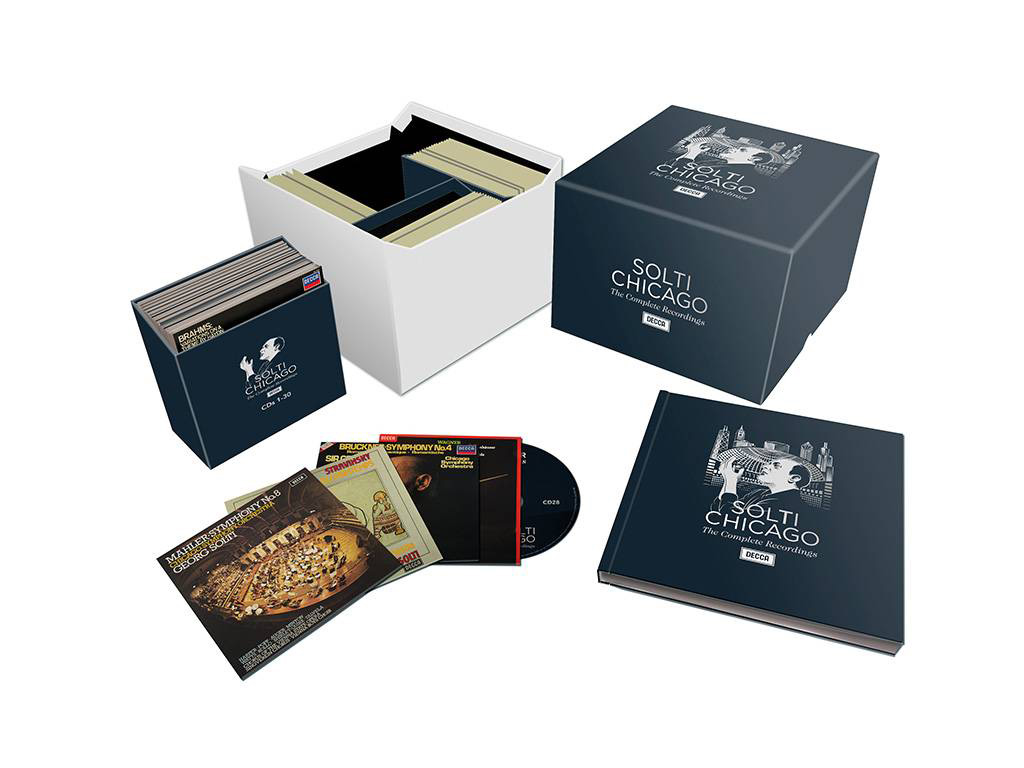
Throughout the history of classical recording there have been a handful of exceptional orchestra/conductor pairings. One thinks of Beecham and the Royal Philharmonic, Karajan and the Berlin Philharmonic, and Bernstein with the New York Philharmonic. Another was the Chicago Symphony Orchestra with their Music Director Fritz Reiner, who held the position from 1953 to 1962, and recorded for RCA.
When Reiner died in 1963, the job was offered to another Jewish Hungarian, Georg Solti, who had first conducted the orchestra at the Ravinia Festival back in 1954. However, Solti had been appointed Music Director at Covent Garden and could not accept. The music directorship went to Jean Martinon, whom Solti described uncharitably in his memoirs as “weak”.
WIN! The entire box set
Click here to enter
Solti finally took up the position in 1969 and remained at the helm until 1991, often returning as Conductor Laureate. He turned the orchestra’s fortunes around, partly because of his lifetime contract with Decca. He made many records in Chicago and another iconic partnership was born. They are all here, including a 1977 Verdi Requiem released by RCA (due to the contractual obligations of soprano Leontyne Price).
Solti’s approach divided critics. His music making was described as muscular, energetic, brisk, and inflexible (although this set often gives the lie to that last complaint). When he died suddenly 20 years ago, the musical world was genuinely shocked: in his eighties Solti was still a dynamo.
“When he died 20 years ago, the musical world was genuinely shocked”
His core repertoire was taped in Chicago: Beethoven, Mahler, Bruckner, Brahms and Bartók. There are two sets of the Beethoven symphonies here, from the early 70s and late 80s. The interpretations are swift but never light-footed, although there is some delicacy, as in the fugal episode in the second movement of Symphony No 7. The orchestra’s precision and power are daunting. Solti did not rethink his approach to Beethoven in the light of historical practice (as the younger Claudio Abbado did): the sound remains big and punchy, also in the Piano Concertos (with Ashkenazy). At its best, this is Beethoven after a fresh spring-cleaning.
The same is true of Solti’s Mahler. Listen to the vigour with which his new orchestra plunges into Symphony No 6: other performances sound cautious by comparison. His Seventh is particularly enjoyable in that respect. Solti had recorded Mahler successfully in London, but eventually got around to covering all nine symphonies in Chicago. One of the first was his award-winning No 8 with such soloists as Heather Harper, Lucia Popp and Australian mezzo Yvonne Minton. It was the first truly clear recording of this massive work. Minton turns up again in the Mahler song cycles, and Das Lied von der Erde where she is paired with tenor René Kollo. While strong soloists, neither seems ideally suited to this cycle.
Five complete operas are included: Beethoven’s Fidelio, Schoenberg’s Moses und Aron, Wagner’s Flying Dutchman and Die Meistersinger von Nürnburg, and Verdi’s Otello. It was Solti’s second recording of Die Meistersinger. He wished to make it “more conversational, like Mozart”, succeeding admirably with a terrific central trio of José Van Dam (Sachs), Karita Mattila (Eva) and Ben Heppner (Walter). The live 1990 recording of Otello (Solti’s last as Music Director) was notable for introducing Pavarotti’s Otello, a part he never played onstage. (One critic wrote: “How could Pavarotti bear to throw away a handkerchief?”) The tenor is compelling in the Act 1 duet with a ravishing Kiri Te Kanawa as Desdemona.
Solti’s weak point was charm: unlike his arch rival Karajan he simply didn’t have it. Hence, he was not at home in French music. Fêtes from Debussy’s Nocturnes is disturbingly rushed, as is the Prélude from Ravel’s Le Tombeau de Couperin. This was repertoire where the “weak” Martinon shone. Solti was more sympathetic in Berlioz: two recordings of Symphonie Fantastique, and one of The Damnation of Faust.
The collection contains contemporary commissions from Michael Tippett (Symphony No 4; Byzantium) and David Del Tredici (Final Alice, with Barbara Hendricks), plus big-band Baroque: Handel’s Messiah, Bach’s St Matthew Passion and B Minor Mass. I had forgotten how well Solti conducted Bartók, with whom he had studied.
Much to enjoy, not least the brilliance of a great orchestra and the justly praised Decca Sound.
WIN! The entire box set
Click here to enter











Comments
Log in to join the conversation.